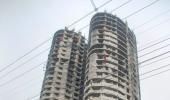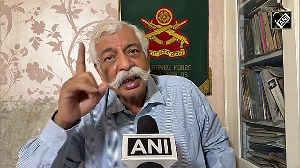As the nearly 100-metre-tall Supertech twin towers were razed to the ground on Sunday, doctors said people living nearby, especially those suffering from respiratory diseases, should take extra care and avoid the area for a few days if possible.

The demolition of nearly 100-metre-tall structures generated an estimated 80,000 tonnes of construction and demolition waste and sent huge clouds of dust billowing in the air.
The doctors said most dust particles are 5 microns or less and can remain suspended in the air for a few days in the absence of favourable meteorological conditions like strong winds and rain.
Massive dust pollution can lead to itching in the eyes, nose and skin; coughing, sneezing, breathing difficulty, lung infection, nasal congestion, asthmatic attacks and aggravate heart problems, they said.
Dr Jugal Kishore, head of Community Medicine department at the Safdarjung Hospital, said, "The dust particles will remain suspended for quite some time in case of low wind speed. People suffering from respiratory problems -- chronic obstructive pulmonary disease, asthma and bronchitis -- should avoid the area, if possible."
"They should limit exposure to the affected area for at least 48 hours. Others living in and around the area should avoid exercises for a few days," he said.
Dr Kishore said people having respiratory diseases should keep taking medicine regularly and consult doctors if their problems aggravate.
Dr Yudhyavir Singh, Assistant Professor, Critical Care, AIIMS, said, "Particulate matter of size smaller than 2.5 microns will be a problem.
"This is likely to increase episodes of coughing, sneezing, asthmatic attacks, lung infection, nasal congestion, breathing difficulty. Viruses may also piggyback the fine particles and increase infection rate, as it's the flu season."
"People should take precaution and keep a buffer stock of medicines. Use N-95 masks and eyeglasses till pollutants dissipate. Wear full-sleeve clothes and avoid morning walks for a few days. Consult doctors if problems worsen," he said.
Dr Dipankar Saha, former chief of the Central Pollution Control Board's air lab, said Noida authorities should keep an eye on air pollution level till the debris is cleared with the help of low-cost sensors.
"Modelling should be done to ascertain the zone of influence. The people living in and around the area should monitor air quality and step out only in unavoidable circumstances. Avoid exposure for a few days. Water sprinkling on regular intervals will help immensely," he said.
The air pollution problem will persist till the debris is cleared and it is certainly going to affect the health of people. A study may be done to ascertain the impact of this demolition, Dr Saha said.
The towers -- taller than Delhi's iconic Qutub Minar -- are the tallest structures yet in India to be demolished.
Over 3,700 kg explosives were used to bring down the structures in pursuance of a Supreme Court order that found their construction within the Emerald Court society premises in violation of norms.
Around 5,000 residents of Emerald Court and adjoining ATS Village societies in Sector 93A vacated their premises on Sunday morning and took away 150-200 pets, including cats and dogs, with them for the day.
The closest buildings next to twin towers are Aster 2 and Aster 3 of Emerald Court society which are just nine metres away.











 © 2025
© 2025